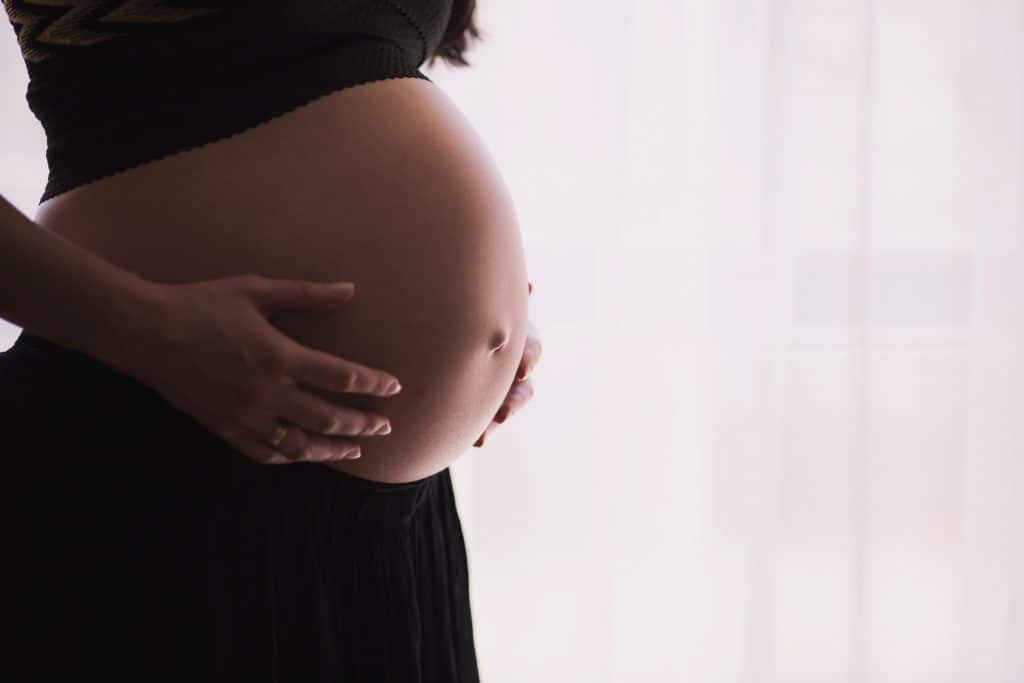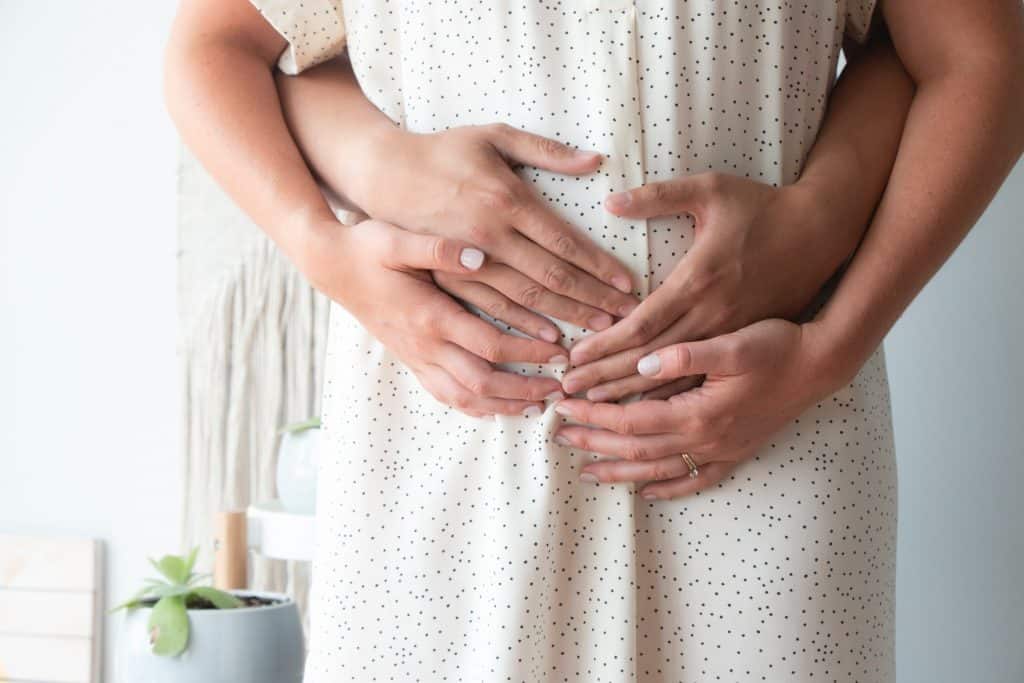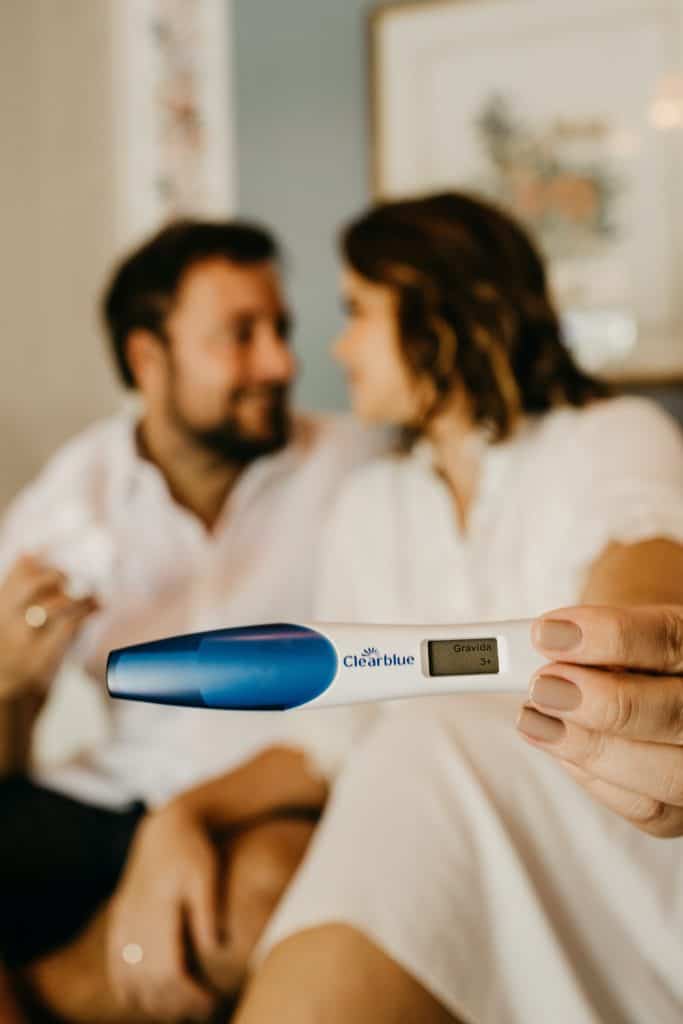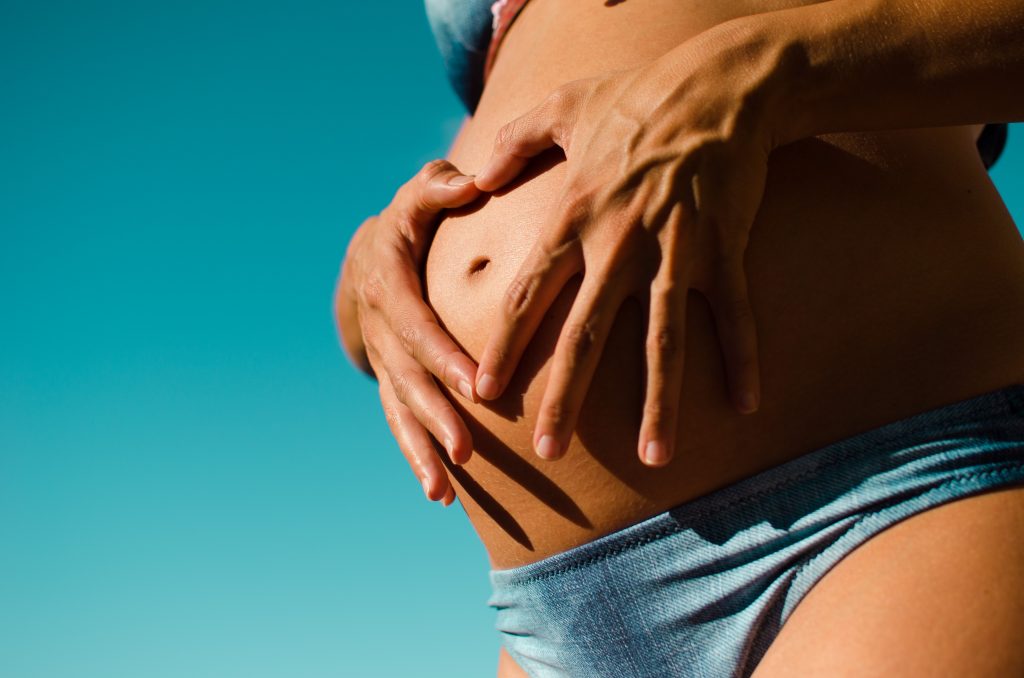The earliest weeks of pregnancy can be a tremendously exciting—and confusing—time. And perhaps the most stressful part of the experience is the beginning, when you’re constantly wondering… ‘am I pregnant?’ Perhaps you have some early pregnancy symptoms, but you’re unsure if they can be attributed to something else.
Take a deep breath. If you’re asking yourself, ‘am I pregnant?’ the easiest way to find out is to take a pregnancy test. Pregnancy tests pick up on a specific hormone called human chorionic gonadotrophin (hCG), which is present in a woman’s body after conception and continues to increase exponentially at the beginning of pregnancy. However, if you can’t test yet, there are a few early signs of pregnancy to look out for.
First, the basics. Pregnancy is divided into three trimesters. The first ranges from week one through 13. The second trimester spans through week 27, and the third goes until week 40. So really, pregnancy lasts 10 months, not nine, as most of us have been taught. If you take a pregnancy test a week after missing your period and the results are positive, you are already likely around four to five weeks pregnant.
Pregnancy is calculated from the date of your last menstrual period, not from the date of conception, which occurs two weeks later. (A pregnant woman will be asked over and over again in doctors’ appointments when the date of her last period was, so it’s vital to keep track, especially as cycles vary.) Still, even during those first few weeks before you test positive, there are some early signs to look for that will help answer the question, ‘am I pregnant?’

11 Early Signs of Pregnancy & How to Deal With Them
Early pregnancy symptoms will vary wildly from one woman to another. Even the same mother-to-be can experience two or three pregnancies completely differently—one leaving her incapacitated with nausea and another with just the slightest bit of fatigue. So don’t panic: Just because your best friend threw up every day of her first trimester doesn’t mean you will. That said, there are some common early pregnancy symptoms if you wonder, ‘am I pregnant?’:
1. Fatigue
Growing a baby is physically akin to climbing Mount Everest. Your body is working extraordinarily hard and there are very high levels of hormones coursing through the body—specifically progesterone, which tends to make you very sleepy and nauseated. Don’t be surprised if you find yourself falling asleep at 8 p.m. on the couch, dropping into a deep slumber for 12 full hours, and waking up feeling exhausted.
Many women start experiencing extreme fatigue as an early pregnancy symptom—around six weeks, says Jocelyn Brown, a licensed midwife at GraceFull Birthing in Los Angeles.
“If you can completely surrender to the exhaustion, build your work schedule around it,” says Brown. “If you have the luxury to take a nap, take a nap. Many women in my practice say, ‘But I have all these things to do!’ You have the rest of your life to do them. Just go to bed—you’re building a skeleton right now!”

2. Nausea
Although this is frequently referred to as “morning sickness,” many women experience it all day every day for weeks (or months) on end. This early pregnancy symptom can begin as early as week two and last through the whole pregnancy, although it begins for most women in the four-to-six-week range and abates at the end of the first trimester. Many women feel it most acutely between weeks nine and eleven, when hormones are peaking.
The reasons for nausea are multifactorial, explains Kerry Price, an OB-GYN in Laguna Hills, California. Rising levels of a hormone called human chorionic gonadotropin (hCG) and progesterone (women who are on progesterone often feel even more nauseated). Progesterone slows the bowel, which can cause constipation; it also slows the esophageal sphincter, which causes acid reflux.
If your nausea is run-of-the-mill morning sickness (you’re not utterly incapacitated, you can keep food down, etc.)… do not let yourself get too hungry. Eat small, frequent meals, and keep them bland. Think crackers, bananas, and popcorn. Keep saltines (or any snack you can stomach) with you at all times—especially by the bed. Eat a few when you get up in the morning or in the middle of the night to pee.
Brown suggests setting an alarm for every hour or two and eating even if you’re not terribly hungry. An empty stomach should be avoided at all costs, and steer clear of spicy foods. Try adding 25 mg of ginger four times a day (or ginger candy or lozenges) to your diet and taking a vitamin B6 complex. Some women find that wearing pressure bands around their wrists (airplane-style) helps. Make sure to stay hydrated.
If your nausea is incapacitating and you can’t keep anything down… consult your doctor or midwife right away. In the age of Kate Middleton’s well-documented hyperemesis gravidarum—a condition in which a pregnant woman is debilitated by nausea and vomiting—it is vital to seek out treatment if you cannot function.
Brown asks her patients: How much is this disrupting your life? Do you need medication or to go on disability? Do you need to be hospitalized? Fortunately, this condition only affects 0.5 to 2 percent of pregnant women. Unfortunately, if you have it for one pregnancy, you are likely to have it for another. “We encourage people to try to go medication free,” Price says, but adds that if a woman really cannot function normally in her day-to-day life, she will prescribe it.

3. Implantation Cramping and/or Bleeding
Implantation bleeding as an early pregnancy symptom usually occurs a few days—or up to two weeks—after implantation. In other words, before you actually know you’re pregnant.
“There are a ton of pregnancies that have early trimester bleeding and turn out to be fine,” explains Price. This has to do with changes in the level of progesterone in the body, or it can be related to the cervix. If the blood is brown and painless, assume all is fine and wear a liner.
4. Heavier Bleeding and/or Cramping
Heavy bleeding, spotting, and cramping can all be early signs of pregnancy. This also could (or could not) be a sign of something more serious, like a miscarriage.
“There are 99 reasons why someone would be bleeding in early pregnancy,” Brown explains, “and only one is miscarriage.” If the blood is dark brown or pink, Brown says she doesn’t usually worry. “Bright red gets my attention.”
If a woman is having cramping but no bleeding, it’s not usually a problem; and bleeding but no cramping may not be cause for alarm either. “It’s when a woman is cramping and bleeding that I worry.” If you are experiencing those symptoms, call your doctor or midwife immediately.
5. Frequent Urination
Asking yourself, ‘am I pregnant’ and have to pee all the time? This is because the rise in hormonal levels brings more blood to your kidneys, which fills your bladder up more quickly. It is also caused by an increase in blood flow (50 percent more!), which means that way more fluid is being circulated through your kidneys.
Stay hydrated with water, but avoid diuretics such as coffee, tea, and other caffeinated drinks. You also want to make sure to empty your bladder completely each time you pee; you can help this along by bending forward slightly when you’re on the toilet.

6. Mood Swings
Wanting to cry for absolutely no reason? Or feeling totally blissed out? Suddenly wracked with anxiety? It may be the hormones if you’re wondering, ‘am I pregnant?’.
Mild mood swings are totally normal, but if you suddenly feel markedly different from how you usually do—or if you’re feeling anxious and/or suicidal—consult your doctor or midwife immediately. They will probably refer you to a psychiatrist who specializes in pre- and postpartum depression and anxiety.
7. Breast Tenderness
This breast tenderness can resemble a sign of PMS, but it’s generally more acute and unrelenting as an early pregnancy symptom. (In fact, it’s not unlike the feeling of first growing breasts.) This often begins in the four-to-six-week range (in other words, around when you’re taking a test) and abates at the end of the first trimester as your hormones level out.
Avoid underwire bras when possible, and wear a sports bra to bed to help dissipate this pain.
8. Heart Palpitations
When you’re growing a baby, your heart has to work considerably harder, and blood supply is increased, which can cause the heart rate to increase by 10 to 20 beats a minute. In some cases, early signs of pregnancy include heart palpitations or abnormalities.
Most heart palpitations are benign and heart racing during pregnancy is not uncommon, but it is wise to ask your doctor about them anyway.

9. Breast Changes
Along with increased breast tenderness, other breast changes during pregnancy can be expected. For example, the areola (area around your nipples) often darkens considerably and can grow larger as a sign of early pregnancy, thanks to the hormones in your body. You might also notice hypersensitivity, little bumps around the areolas, and the skin may start to feel itchy as the breasts grow.
These early pregnancy symptoms are usually benign, but always consult your doctor about irregular bumps or lumps, as they could be a sign of breast cancer.
10. Increase in Body Temperature
This is something that you may only notice if you’ve been charting your basal body temperature while trying to conceive. If the basal body temperature stays high, it can indicate that you are pregnant.
11. Smell Sensitivity and Food Aversions
Some women report being able to smell scents from many rooms away and not being able to stand the look or smell of certain foods. You also may experience cravings for foods you normally don’t like, strange food combinations, or other unusual food appetites. For example, you may have a sudden aversion to, say, coffee, which you have always loved.

When Can I Take a Pregnancy Test?
To confidently answer the question, ‘am I pregnant?’, you’ll need to take a pregnancy test. For most women, other pregnancy symptoms don’t come until after a missed period, which is why that’s one of the early signs of pregnancy most women rely on. Some women can sense it even earlier through these early pregnancy symptoms, especially if they’ve been pregnant before, but the best way to know is to take a test.
An at-home pregnancy test will measure the level of hCG in your urine; this hormone is only present if you’re pregnant. According to the Mayo Clinic, the best time to take a test is one week after your missed period. If you take it before then, the pregnancy may not be detectable, leading to a false negative, because it takes seven to 10 days for hCG to be present in the urine after successful implantation of the egg.
In fact, the hCG concentration doubles every two to three days during early pregnancy, so even taking it a day after a missed period can result in a false negative. That said, if you take it too early, you could also get a false positive. A chemical pregnancy is when you have a fertilized egg that doesn’t implant. Pregnancy tests are so sensitive these days, however, that you are given a positive result before the egg implants. A week later, your period comes, which indicates that you are not pregnant.
Although tests vary by sensitivity, if you wait to test until a week after your missed period, chances are the pregnancy results are accurate. Here’s the thing: positive results are almost always accurate. But you can get a false negative if you take the test too early or don’t follow the instructions on the box properly. If you get a negative result and your period still doesn’t come for a few days, take the test again.

I’m Pregnant! What Do I Do Now?
So you saw the double line or the “pregnant” sign on the test. Your answer to the question of ‘am I pregnant?’ is a yes! Now what? It’s time to find yourself an obstetrician or a midwife, who will perform a blood test to confirm the pregnancy.
1. Eat well.
If you are feeling very sick, this can be tough. Look for protein-rich foods and eat whichever of those you can stomach. Brown suggests peanut or almond butter, salted nuts (the salt will bring up your electrolytes), hard-boiled eggs, protein smoothies (don’t worry if you can only get half of it down), or a piece of jerky.
“Pregnant women tend to go for the carbs, but this is putting the wrong kind of bacteria in your gut,” Brown explains. “Bad morning sickness can be exacerbated by poor balances of flora—a gut bacteria that’s not helping you.” She advises reducing carbs if possible because that will also decrease your sugar intake, which is good. If this doesn’t seem possible, take a probiotic; this can reduce nausea in the long run.
2. Continue (or start) exercising.
What were you doing before? This is usually a good gauge of what kind of strain you can put your body through while pregnant. If you were a ballet dancer, there’s no reason to stop dancing. But if you were a fan of hot spinning, hot tubs, saunas, or hot yoga, you’ll want to steer clear. If you hadn’t found time to exercise in your pre-pregnancy life, it’s a good time to start.
“I advise 150 minutes of moderate intensity exercise a week,” Brown says, “and start small.” This means 30 minutes, five times a week. It can be anything from going for walk in your neighborhood to taking a prenatal yoga class to swimming.

3. Take prenatal vitamins.
Folic acid supplements are the most important prenatal vitamin, since they help prevent neural tube defects like spina bifida and cleft lip. The time to take them, however, is in the first four to seven weeks.
“We tell people to start taking them three months before conceiving so you have good levels of folic acid in your body already,” says Price. The usual suggestion is 400 micrograms of folate a day, says Brown. In addition to folic acid, you can also get folate from food, such as dark leafy greens, broccoli, avocado, beans, peas, and lentils. If you can’t stomach those right now, “make the ‘better than’ choice,” advises Brown.
4. Manage any chronic health problems, including weight.
A healthy weight can influence pregnancy outcomes, Price explains—everything from risk for C-section to postpartum depression and success with breastfeeding. This does not mean to diet or restrict your intake; it simply means to maintain an active, healthy lifestyle and address any chronic health problems, including your mental health.
5. Avoid some foods.
Many women stick to certain foods during the first trimester, and they are by and large safe. But some to stay clear of are any raw, undercooked, or unpasteurized fish, meat, or dairy; raw sprouts (especially alfalfa, which can contain Salmonella); and alcohol. Make sure to wash raw vegetables very well and avoid eating fish with high levels of mercury (e.g., tuna, shark, and swordfish).
Caffeine should be drunk minimally (no more than one cup of coffee a day). That said, as with everything pregnancy related, these will vary from culture to culture. Women in Japan eat sushi during pregnancy, but it’s fresh. Some French women drink a minimal amount of wine. In all things, talk to your doctor and trust your own body.




